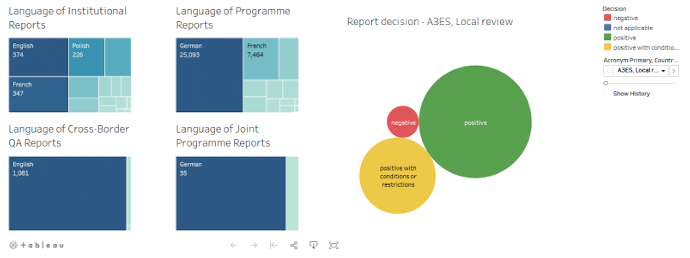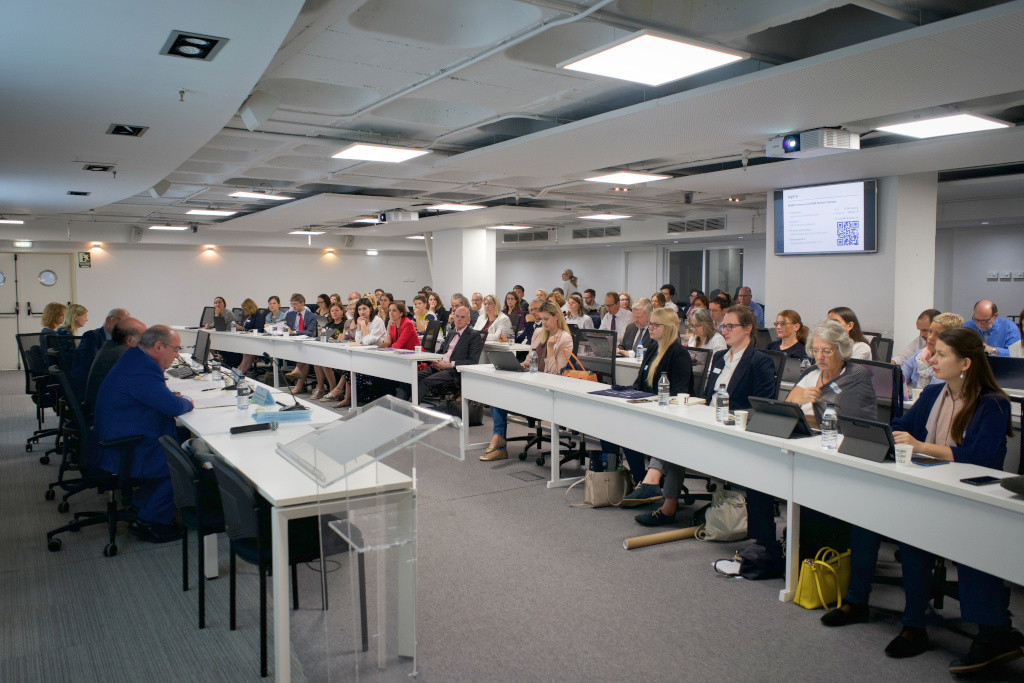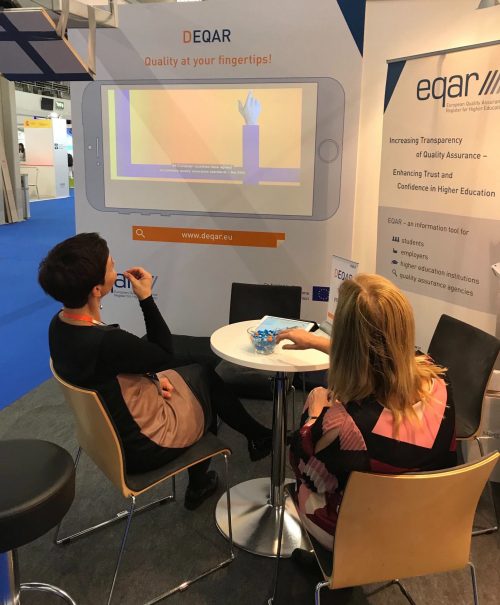Database of External QA Results (DEQAR)
The development and expansion of the DEQAR database, launched in 2018, was further propelled by the EU co-funded DEQAR project which had started at the end of 2017. The project, coordinated by EQAR, included as partners 17 EQAR-registered quality assurance agencies, the German Accreditation Council (GAC) and the German Rectors’ Conference (HRK), the key European stakeholder organisations in higher education (ENQA, ESU, EUA, EURASHE, Education International, the Italian Information Centre on Academic Mobility and Equivalence (CIMEA) on behalf of the ENIC-NARIC network) and one research centre (Ghent University).
Throughout 2019, the main DEQAR activities were the further development and refinement of the database, the promotion and dissemination of DEQAR both at events and online, and the organisation of the DEQAR Conference.
- First seeds
EQAR’s Strategic Plan 2013-2017, approved by the GA of 2013, included the provision to “explore the feasibility of a database of evaluated and accredited institutions and programmes, linking with existing initiatives where possible”. This feasibility study on the Database, including surveys of potential users and registered agencies, as well as desk research of existing database initiatives was done in 2016. - Sprout
The resulting Report and Operational Model were then presented to EQAR members (European governments and stakeholder organisations) at the 2016 Members’ Dialogue. Most members had received positive feedback from their national stakeholders and considered that the database would enhance accessibility of external quality assurance results. - Nourishment
In March 2017, EQAR applied for Erasmus+ co-funding (Support to policy reform, Forward-looking cooperation projects) to develop this database. The DEQAR (Database of External Quality Assurance Results) project, with a 2-year duration, was approved later that year and started in November 2017. - Seedling
In May 2018, the database was officially launched coinciding with the Ministerial Conference in Paris. It contained 1 488 reports, uploaded by six quality assurance agencies. - Flowering
At the end of 2019, the DEQAR database contained > 40 000 reports uploaded by 31 agencies and had received a fair share of attention in the form of newsletter items, interviews, testimonials and even television coverage.
The aim of DEQAR is to allow users to identify whether a higher education institution has been subject to external quality assurance in line with the ESG and to easily access the corresponding quality assurance report(s). Target audiences include amongst others recognition information centres (ENIC-NARICs), recognition officers, the leadership of higher education institutions, policy makers, academics, students and employers.
Status quo end of 2019
At the end of 2019, DEQAR had 31 quality assurance agencies that had uploaded more than 40 000 reports collectively, covering more than 2 000 higher education institutions from 44 EHEA countries and 340 reports across 25 non-EHEA countries.
The following tables provide a detailed breakdown by agency and type of reports.
DEQAR had significant coverage of 16 higher education systems by the end of 2019: Belgium (Flemish community), Croatia, Denmark, Estonia, Finland, France, Germany, Liechtenstein, Luxembourg, Montenegro, North Macedonia, Poland, Portugal, Romania, Spain and Slovenia.
Note on “significant coverage”: In these systems, DEQAR includes reports on more than half of the higher education institutions, compared to the total number according to the European Tertiary Education Register (ETER) or national lists provided to EQAR. For extremely small higher education systems (< 5 higher education institutions), significant coverage is considered if the higher education institution(s) is/are the dominant institution(s) in the system and a large proportion of the institution(s) is covered, i.e. not only a small number of programmes.
| Reports | Institutions | Countries | |
|---|---|---|---|
| EHEA | 46 779 | 2 165 | 44 |
| Non-EHEA | 367 | 77 | 31 |
| Agency | Based in | No. of reports in DEQAR | |
|---|---|---|---|
| Institutional | Programme | ||
| A3ES | Portugal | 71 | 503 |
| AAQ | Switzerland | 15 | |
| ACPUA | Spain | 7 | 79 |
| ACQUIN | Germany | 27 | 5901 |
| ACSUCYL | Spain | 289 | |
| ACSUG | Spain | 169 | |
| AHPGS | Germany | 7 | 1111 |
| AI | Denmark | 38 | |
| ANQA | Armenia | 6 | |
| AQAS | Germany | 19 | 7260 |
| AQU | Spain | 2477 | |
| ARACIS | Romania | 105 | 1840 |
| ASHE | Croatia | 163 | 151 |
| ASIIN | Germany | 3 | 6519 |
| BAC | United Kingdom | 33 | |
| EKKA | Estonia | 20 | 160 |
| evalag | Germany | 20 | 515 |
| FIBAA | Germany | 18 | 1618 |
| FINEEC | Finland | 58 | 5 |
| fmid | Spain | 936 | |
| HCERES | France | 338 | 7464 |
| IAAR | Kazakhstan | 1 | 35 |
| IEP | Switzerland | 52 | |
| IQAA | Kazakhstan | 25 | 499 |
| MusiQuE | Belgium | 1 | 38 |
| NCEQE | Georgia | 7 | 19 |
| NCPA | Russia | 2 | 300 |
| NVAO | Netherlands | 20 | 1964 |
| PKA | Poland | 226 | 1476 |
| SQAA | Slovenia | 41 | 953 |
| Unibasq | Spain | 212 | |
Key developments and activities
After the launch of DEQAR in 2018, EQAR continued working on the database in order to further improve and refine its design, scope and structure, always taking into account the feedback of users and stakeholders. The following new features were introduced in 2019:
- The Datadump function: with just one click, website visitors can download a full dump of the data currently in DEQAR to use for analysis and research, free of charge. The data – structured data on reports, institutions, agencies and countries – are provided in CSV format, so that they can easily be opened and manipulated. This feature will be mainly interesting for researchers, organisations and other projects/applications.
- Continuous access to live DEQAR data by using the application programming interface (API): this allows organisations to feed data directly into their local application or system by using the API as a back-end to their website or to feed data into their research or data analytics software. This feature could be interesting for ENIC-NARICs, information platforms, quality assurance agencies, higher education institutions and national organisations.
- A new layout for the DEQAR results pages : this includes the Advanced Search—in the form of granular “drill-down” features— which was developed to allow researchers and super-users to undertake highly customised searches.
- Infographics: this tool was created to enhance the appeal of the database to all target groups, presenting visualisations of otherwise purely numerical data. It provides key insights based on DEQAR data, including statistics on the report types per agency, report languages and formal decisions.

Other DEQAR related activities were the publication of the DEQAR pilot studies, the production of DEQAR promotional material, the promotion and dissemination of DEQAR at events and the DEQAR Conference.
Our DEQAR project partner researchers Jeroen Huisman and Maria Manatos of UGent – the Centre for Higher Education Governance Ghent (CHEGG) have been using the database as a basis for two pilot pan-European comparative studies into how higher education institutions respond to the needs of students and society, based on thousands of external quality assurance reports being available in DEQAR.
The first Pilot Study explored how aspects of programme design, approval and monitoring are present in institutional external quality assurance reports across different national contexts.
The second Pilot Study, focused on how standards related to student-centred learning are interpreted in a cross-border QA context.
- DEQAR promotional material
DEQAR flyers were created, published and distributed at events. Presenting a quick, bulleted overview of “What, Why, for Whom and How” it also includes two user testimonials and thus provides easy to read, complete, but concise information for those with little knowledge of DEQAR.
DEQAR explainer video: this video was created to explain and promote the whats and whys of the database in an easy to understand, engaging way and lasts just 1,5 minutes. Special mini-videos (loops) targeted to different audiences were also created, specifically as attachments for social media.
Although this started already at the end of 2017, it came into full swing in 2019, culminating in the DEQAR Conference. DEQAR was promoted at a total of 27 events in 2019 and included seminars, conferences and bilateral meetings. Some of the larger events in 2019 included the EAIE (European Association for International Education) Annual Conference in September, the TAICEP ((Association for International Credential Evaluation Professionals) in October and the EQAF (European Quality Assurance Forum) in November.
- DEQAR Conference
The DEQAR Conference “From Quality to Automatic Recognition and Mobility” was held on 7-8 October in Madrid. The conference was held in conjunction with the annual EQAR Members’ Dialogue and was attended by more than 100 participants from the field: ENIC NARICs, higher education recognition officers, ministry representatives, QAAs, higher education leadership, students, student representatives and researchers, representing the target groups of DEQAR.
The conference included a plenary session, parallel sessions and world-cafe-style presentations. The event showcased the state-of-the-art of DEQAR, presented the final Pilot Studies and good practice examples, and solicited feedback for future strategy. Quality assurance agencies were gathered in an Agency Hub to discuss technical developments and issues.
Read more about the Conference (programme, speakers, presentations etc)

Moving forward and DEQAR CONNECT
The DEQAR conference marked the end of the European Forward-Looking Cooperation Project period. During that period (November 2017 – October 2019) the DEQAR database was developed and launched and promoted by EQAR, as project coordinator, and also by the 29 project partners.
The end of the project paved the way for a new phase in DEQAR, time to look forward and consolidate: how can we make sure that more QAAs participate in the database, how can we further improve, link, make use of and promote DEQAR? To this end, it was decided to apply for a new project under the Erasmus PLUS call to support the implementation of European Higher Education Area (EHEA) reforms.
The project application for Enhancing the Coverage and Connectivity of QA in the EHEA through DEQAR (DEQAR CONNECT) was submitted in September 2019 and has 25 project partners, of which 16 QAAs that are new to DEQAR and four ENIC NARICs. The project was subsequently approved for EU co-funding with a start date in 2020.
The DEQAR CONNECT project focuses on two of the EHEA key commitments, supporting quality assurance and recognition inside the EHEA, and consists of two strands:
- DEQAR CONNECT will expand coverage to EHEA countries currently under-represented in DEQAR, by supporting the participation of agencies that could not join DEQAR in the first stage.
- DEQAR CONNECT aims to enhance connectivity by exploiting existing synergies and exploring new opportunities to use DEQAR data directly in the recognition workflow, digital credentialing and elsewhere.
-
DEQAR project pages
-
Explainer video
-
Interactive data visualisation
-
DEQAR Conference
-
Pilot studies
-
Testimonials, interviews and newsletter articles
